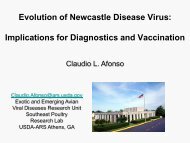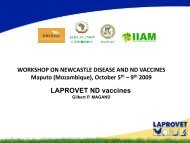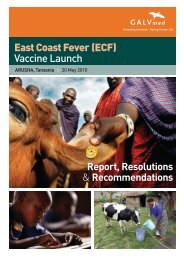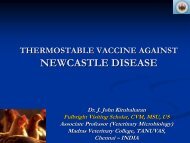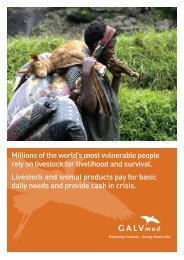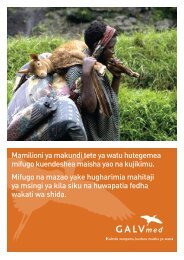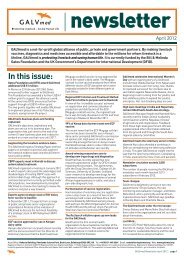A Path to Prosperity New Directions for African Livestock
GALVmed Impetus Strategy Paper
GALVmed Impetus Strategy Paper
- No tags were found...
You also want an ePaper? Increase the reach of your titles
YUMPU automatically turns print PDFs into web optimized ePapers that Google loves.
The ISP has advocated greater utilisation of value<br />
chain analysis or ‘talking shops’ as one mechanism<br />
<strong>for</strong> promoting contract farming and improved trade<br />
policy. Participants confirmed that the links between<br />
the different ac<strong>to</strong>rs in value-chains are weak. Ac<strong>to</strong>rs<br />
rarely have the opportunity <strong>to</strong> come <strong>to</strong>gether and<br />
discuss their objectives and challenges. It was<br />
agreed that understanding the priorities of different<br />
ac<strong>to</strong>rs in the value chain is important if effective<br />
marketing and trade policy is <strong>to</strong> be developed. It was<br />
observed that the priorities of farmers commonly<br />
differ <strong>to</strong> those of service providers particularly<br />
veterinarians. For example farmers commonly<br />
prioritize production diseases, where as<br />
government veterinary services are more interested<br />
in transboundary animal diseases and trade limiting<br />
issues, international funding organizations are<br />
commonly interested in pandemic threats, the<br />
private sec<strong>to</strong>r in sales, public health officials in<br />
zoonoses, researchers in publications etc.<br />
In line with the conclusions of the ISP, it was felt<br />
contract farming should be a key mechanism <strong>for</strong><br />
improving the profitability and production of small<br />
scale producers; however greater awareness of<br />
contract farming is urgently needed both within<br />
farmer organisations and the private sec<strong>to</strong>r. The key<br />
bottle necks <strong>to</strong> scaling up contract farming in Sub<br />
Saharan where described as;-<br />
> inadequate policies;<br />
> poor awareness and direct involvement of<br />
producers;<br />
> lack of producer co-operatives or groups with<br />
knowledge about their rights<br />
> inadequate support, particularly micro finance;<br />
> poor infrastructure development – as most<br />
lives<strong>to</strong>ck products are perishable, goods require<br />
cold chain or quick transport <strong>to</strong> market.<br />
The use of new technologies particularly mobile<br />
phones was advocated.<br />
Finally, it was noted that small and poor farmers<br />
will inevitably drop out of the market place in<br />
coming years and this may not be a bad thing as<br />
long as alternative livelihoods options and safety<br />
nets are available <strong>for</strong> the most vulnerable.<br />
The e discussion has now closed.<br />
GALVmed would like <strong>to</strong> thank all the participants<br />
who followed the discussion. We know your time<br />
is valuable and hope you found some new<br />
in<strong>for</strong>mation and ideas of use. We are particular<br />
grateful <strong>to</strong> those of you who posted comments.<br />
We have had many thoughtful, passionate and<br />
sincere contributions drawing upon a wealth<br />
of experience. These were much appreciated.<br />
Our objective over the past few weeks has been <strong>to</strong><br />
gather opinion and ideas on how the Impetus<br />
Strategy paper (ISP) might be improved. I believe<br />
we have, through your constructive criticism and<br />
suggestions, achieved that objective.<br />
Please find below some notes on the key issues<br />
that arose.<br />
In terms of the overall lives<strong>to</strong>ck sec<strong>to</strong>r in Sub<br />
Saharan Africa:<br />
> The discussants confirmed support <strong>for</strong> the<br />
creation of a lives<strong>to</strong>ck <strong>for</strong>um that provides an<br />
opportunity <strong>for</strong> a range of stakeholders, not just<br />
government and international agencies, <strong>to</strong> voice<br />
their opinions. There was strong advocacy <strong>for</strong><br />
greater synergy and collaboration between key<br />
ac<strong>to</strong>rs, including the private sec<strong>to</strong>r and civil<br />
society. There is a need <strong>to</strong> re-appraise the state<br />
of the lives<strong>to</strong>ck sec<strong>to</strong>r in Africa (both successes<br />
and failures) if we are strengthen and develop a<br />
range of effective lives<strong>to</strong>ck policies.<br />
> Contribu<strong>to</strong>rs reminded us that lives<strong>to</strong>ck keeping<br />
is not just about monetary gain. Lives<strong>to</strong>ck are<br />
important social capital <strong>for</strong> millions of people,<br />
providing highly nutritious food <strong>to</strong> subsistence<br />
farmers and the poor, manure <strong>for</strong> crop<br />
production and draft power.<br />
> Greater recognition of the key role that working<br />
equines play in supporting peoples’ livelihoods<br />
was advocated along with the need <strong>to</strong> do more<br />
<strong>for</strong> their specific health problems and medicinal<br />
requirements.<br />
The Impetus Strategy Paper I Page 82



